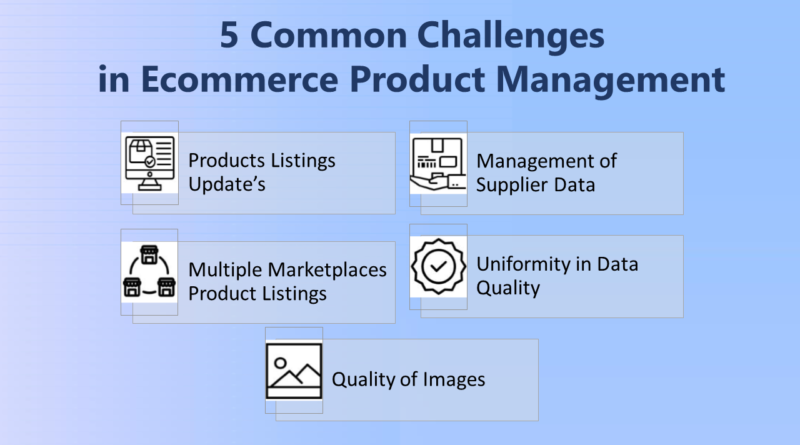5 Common Challenges in E-commerce Product Management
E-commerce Management: Understanding Common Challenges and Solutions for Optimizing Product Catalogs
E-commerce has revolutionized the way we shop. With the rise of technology and online platforms, people can now buy products whenever and wherever they want, from the comfort of their own homes. This has created immense opportunities for businesses to easily reach customers, expand operations, and increase sales. But as e-commerce becomes increasingly popular, managing hundreds and thousands of products on online stores can prove challenging. Retailers need to constantly maintain and update product data to ensure their product catalogs remain accurate, complete, and reliable to meet customer needs and expectations. In this article, we discuss 5 common challenges in e-commerce product management, explore their impact, and provide solutions to optimize product catalogs.
Product Catalog Management Challenges
A product catalog is a vital component of e-commerce. It is a collection of products and services that retailers offer. It includes product descriptions, images, pricing, and other important information. Additionally, product catalogs help customers understand and choose the products they want to buy. Retailers need to ensure their product catalogs are accurate and complete to provide customers with a hassle-free shopping experience. In today’s highly competitive e-commerce market, a well-managed product catalog can be the difference between success and failure.
Products Listings Update’s
Retailers need to continuously update their product catalogs based on various factors such as fluctuations in product cost, the introduction of new products, or changes in customer demand. This can prove challenging for retailers who might have hundreds or thousands of products to manage. Updating product catalogs can be time-consuming and require continuous attention to detail. Retailers must pay attention to content management, information accuracy, and consistency. Additionally, with the rise of various channels such as eBay, Amazon, and other marketplaces, retailers must ensure that their product catalogs are up-to-date across all platforms. It is a daunting task to keep up with the changes and continuous updating required to maintain an optimized product catalog.
A poorly organized catalog can hamper the retailer’s ability to increase product category lists. Retailers must ensure that the product catalog is organized right from the start and contains accurate and complete information. This can be helpful when retailers decide to scale up their product catalog in the future.
Management of Supplier Data
Retailers rely on suppliers to provide product data for their product catalogs. However, suppliers may not always provide accurate or appropriate data. As a result, it becomes the responsibility of the retailer to ensure that the product data received from suppliers is authentic and suitable for listing. Suppliers may use inappropriate spellings for product descriptions, making it time-consuming for retailers to correct and make it consistent with their product catalog. This can lead to errors in the product description or incomplete information, resulting in a negative impact on customer experience. To avoid this, retailers should verify the data received from suppliers and ensure it is correct and consistent.
Multiple Marketplaces Product Listings
Many businesses need to manage their product listings across multiple sales channels such as Amazon, eBay, and their e-commerce store. Each platform has different product listing structures, and product categories on Amazon are different from those on eBay.
Managing product listings on multiple e-commerce platforms can be time-consuming and prone to errors. The impact of failing to manage product listings across multiple sales channels
Includes overselling or underselling products, mismatched categories, and incomplete product information. These issues can lead to a poor customer experience and reduce sales revenue.
Uniformity in Data Quality
Uniformity in data quality can be a challenge for retailers with a large number of suppliers. Enterprises must ensure that the entire product catalog is consistent with accurate and complete information. Inaccuracies can arise due to data clashes, missing data, spelling errors, or inadequate descriptions. Inconsistencies in data can lead to confusion among customers and leave a negative impression on the retailer’s brand image. Retailers must ensure that their product catalogs are regularly reviewed and updated for optimal data quality and consistency across all channels.
Quality of Images
The quality of product images is crucial for driving sales and creating a positive customer experience. Poor-quality images can leave customers unsure about the product, leading to fewer conversions. Another challenge with product images is receiving high-quality images from suppliers. Suppliers may provide low-quality images, inconsistent style, and the wrong image size. Retailers should request high-quality images from their suppliers that are consistent with the website’s style and size guidelines. They can establish a specific image standard guide for suppliers to follow and provide feedback on changes required. Retailers can also invest in image editing software to enhance the quality of product images before posting them on their websites.
Solutions to eCommerce Product Management Challenges
E-commerce product management challenges can be overwhelming, and retailers must address each challenge to build a successful product catalog. Retailers can invest in dedicated and experienced product management teams to manage their catalogs and update them regularly. However, smaller retailers or startups may not have the resources to invest in product management teams. In such cases, they can consider outsourcing the task to professionals who offer e-commerce catalog processing services. Outsourcing can be essential to ensure accurate and efficient handling of the product catalog, optimization for multiple channels, and timely updating.
Outsourcing e-commerce catalog processing services can be cost-effective as it allows retailers to shift their focus to other crucial aspects of their business operations. It also provides access to experienced teams who can manage the catalog with precision and attention to detail. Retailers can be assured that their product catalogs are up-to-date and have consistent data across all channels. The service provider can ensure that the product data is accurate, complete, and reliable, enhancing the customer experience and improving brand reputation.
Outsourcing also provides access to expertise in managing supplier data. An expert team can verify the accuracy and authenticity of the product data received from suppliers and ensure that it is suitable for listing. The team can also manage multiple channels and modify product listings as per each channel’s unique requirements. This can save retailers time, effort, and resources.
Conclusion
In conclusion, e-commerce product management can be challenging for retailers dealing with a large number of products, suppliers, and channels. Maintaining accurate, complete, and reliable product catalogs can be crucial for enhancing the customer experience and improving brand reputation. Retailers can face various challenges such as updating products, managing supplier data, selling through multiple channels, and maintaining uniform data quality across the entire product catalog. However, outsourcing e-commerce catalog processing services can be a cost-effective and efficient solution for managing product catalogs, optimizing listings, and ensuring that the details are accurate, updated in real time, and consistent across all channels. Retailers can thus focus on growing their business while ensuring a hassle-free shopping experience for their customers.




